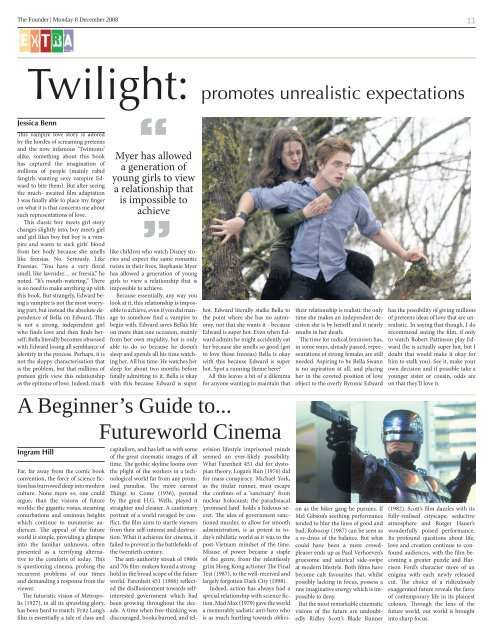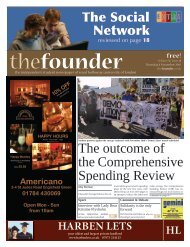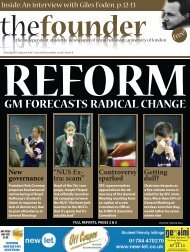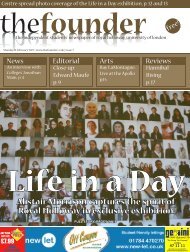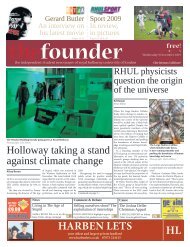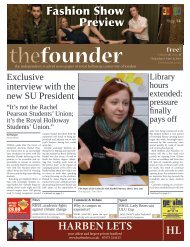Holloway mourns death of student - The Founder
Holloway mourns death of student - The Founder
Holloway mourns death of student - The Founder
You also want an ePaper? Increase the reach of your titles
YUMPU automatically turns print PDFs into web optimized ePapers that Google loves.
<strong>The</strong> <strong>Founder</strong> | Monday 8 December 2008<br />
E X T R A<br />
11<br />
Twilight: promotes unrealistic expectations<br />
Jessica Benn<br />
This vampire love story is adored<br />
by the hordes <strong>of</strong> screaming preteens<br />
and the now infamous ‘Twimoms’<br />
alike, something about this book<br />
has captured the imagination <strong>of</strong><br />
millions <strong>of</strong> people (mainly rabid<br />
fangirls wanting sexy vampire Edward<br />
to bite them). But after seeing<br />
the much- awaited film adaptation<br />
I was finally able to place my finger<br />
on what it is that concerns me about<br />
such representations <strong>of</strong> love.<br />
This classic boy meets girl story<br />
changes slightly into, boy meets girl<br />
and girl likes boy but boy is a vampire<br />
and wants to suck girls’ blood<br />
from her body because she smells<br />
like freesias. No. Seriously. Like<br />
Freesias. “You have a very floral<br />
smell, like lavender… or freesia,” he<br />
noted. “It’s mouth-watering.” <strong>The</strong>re<br />
is no need to make anything up with<br />
this book. But strangely, Edward being<br />
a vampire is not the most worrying<br />
part, but instead the absolute dependence<br />
<strong>of</strong> Bella on Edward. This<br />
is not a strong, independent girl<br />
who finds love and then finds herself;<br />
Bella literally becomes obsessed<br />
with Edward losing all semblance <strong>of</strong><br />
identity in the process. Perhaps, it is<br />
not the sloppy characterisation that<br />
is the problem, but that millions <strong>of</strong><br />
preteen girls view this relationship<br />
as the epitome <strong>of</strong> love. Indeed, much<br />
Ingram Hill<br />
“<br />
Myer has allowed<br />
a generation <strong>of</strong><br />
young girls to view<br />
a relationship that<br />
is impossible to<br />
achieve<br />
”<br />
like children who watch Disney stories<br />
and expect the same romantic<br />
twists in their lives, Stephanie Myer<br />
has allowed a generation <strong>of</strong> young<br />
girls to view a relationship that is<br />
impossible to achieve.<br />
Because essentially, any way you<br />
look at it, this relationship is impossible<br />
to achieve, even if you did manage<br />
to somehow find a vampire to<br />
begin with. Edward saves Bella’s life<br />
on more than one occasion, mainly<br />
from her own stupidity, but is only<br />
able to do so because he doesn’t<br />
sleep and spends all his time watching<br />
her. All his time. He watches her<br />
sleep for about two months before<br />
finally admitting to it. Bella is okay<br />
with this because Edward is super<br />
A Beginner’s Guide to...<br />
Far, far away from the comic book<br />
convention, the force <strong>of</strong> science fiction<br />
has burrowed deep into modern<br />
culture. None more so, one could<br />
argue, than the visions <strong>of</strong> future<br />
worlds: the gigantic vistas, steaming<br />
conurbations and ominous heights<br />
which continue to mesmerise audiences.<br />
<strong>The</strong> appeal <strong>of</strong> the future<br />
world is simple, providing a glimpse<br />
into the familiar unknown, <strong>of</strong>ten<br />
presented as a terrifying alternative<br />
to the comforts <strong>of</strong> today. This<br />
is questioning cinema, probing the<br />
recurrent problems <strong>of</strong> our times<br />
and demanding a response from the<br />
viewer.<br />
<strong>The</strong> futuristic vision <strong>of</strong> Metropolis<br />
(1927), in all its sprawling glory,<br />
has been hard to match. Fritz Lang’s<br />
film is essentially a tale <strong>of</strong> class and<br />
hot. Edward literally stalks Bella to<br />
the point where she has no autonomy,<br />
not that she wants it - because<br />
Edward is super hot. Even when Edward<br />
admits he might accidently eat<br />
her because she smells so good (got<br />
to love those freesias) Bella is okay<br />
with this because Edward is super<br />
hot. Spot a running theme here?<br />
All this leaves a bit <strong>of</strong> a dilemma<br />
for anyone wanting to maintain that<br />
Futureworld Cinema<br />
their relationship is realisti: the only<br />
time she makes an independent decision<br />
she is by herself and it nearly<br />
results in her <strong>death</strong>.<br />
<strong>The</strong> time for radical feminism has,<br />
in some ways, already passed, representations<br />
<strong>of</strong> strong females are still<br />
needed. Aspiring to be Bella Swann<br />
is no aspiration at all, and placing<br />
her in the coveted position <strong>of</strong> love<br />
object to the overly Byronic Edward<br />
capitalism, and has left us with some<br />
<strong>of</strong> the great cinematic images <strong>of</strong> all<br />
time. <strong>The</strong> gothic skyline looms over<br />
the plight <strong>of</strong> the workers in a technological<br />
world far from any promised<br />
paradise. <strong>The</strong> more earnest<br />
Things to Come (1936), penned<br />
by the great H.G. Wells, played it<br />
straighter and cleaner. A cautionary<br />
portrait <strong>of</strong> a world ravaged by conflict,<br />
the film aims to startle viewers<br />
from their self-interest and destruction.<br />
What it achieves for cinema, it<br />
failed to prevent in the battlefields <strong>of</strong><br />
the twentieth century.<br />
<strong>The</strong> anti-authority streak <strong>of</strong> 1960s<br />
and 70s film-makers found a stronghold<br />
in the broad scope <strong>of</strong> the future<br />
world. Farenheit 451 (1966) reflected<br />
the disillusionment towards selfinterested<br />
government which had<br />
been growing throughout the decade.<br />
A time when free-thinking was<br />
discouraged, books burned, and television<br />
lifestyle imprisoned minds<br />
seemed an ever-likely possibility.<br />
What Farenheit 451 did for dystopian<br />
theory, Logan’s Run (1976) did<br />
for mass conspiracy. Michael York,<br />
as the titular runner, must escape<br />
the confines <strong>of</strong> a ‘sanctuary’ from<br />
nuclear holocaust; the paradisiacal<br />
‘promised land’ holds a hideous secret.<br />
<strong>The</strong> idea <strong>of</strong> government sanctioned<br />
murder, to allow for smooth<br />
administration, is as potent in today’s<br />
nihilistic world as it was to the<br />
post-Vietnam mindset <strong>of</strong> the time.<br />
Misuse <strong>of</strong> power became a staple<br />
<strong>of</strong> the genre, from the relentlessly<br />
grim Hong Kong actioner <strong>The</strong> Final<br />
Test (1987), to the well-received and<br />
largely forgotten Dark City (1998).<br />
Indeed, action has always had a<br />
special relationship with science fiction.<br />
Mad Max (1979) gave the world<br />
a memorably sadistic anti-hero who<br />
is as much hurtling towards oblivion<br />
as the biker gang he pursues. If<br />
Mel Gibson’s seething performance<br />
tended to blur the lines <strong>of</strong> good and<br />
bad, Robocop (1987) can be seen as<br />
a re-dress <strong>of</strong> the balance. But what<br />
could have been a mere crowdpleaser<br />
ends up as Paul Verhoeven’s<br />
gruesome and satirical side-swipe<br />
at modern lifestyle. Both films have<br />
become cult favourites that, whilst<br />
possibly lacking in focus, possess a<br />
raw imaginative energy which is impossible<br />
to deny.<br />
But the most remarkable cinematic<br />
visions <strong>of</strong> the future are undoubtedly<br />
Ridley Scott’s Blade Runner<br />
has the possibility <strong>of</strong> giving millions<br />
<strong>of</strong> preteens ideas <strong>of</strong> love that are unrealistic.<br />
In saying that though, I do<br />
recommend seeing the film, if only<br />
to watch Robert Pattinson play Edward<br />
(he is actually super hot, but I<br />
doubt that would make it okay for<br />
him to stalk you). See it, make your<br />
own decision and if possible take a<br />
younger sister or cousin, odds are<br />
on that they’ll love it.<br />
(1982). Scott’s film dazzles with its<br />
fully-realised cityscape, seductive<br />
atmosphere and Rutger Hauer’s<br />
wonderfully poised performance.<br />
Its pr<strong>of</strong>ound questions about life,<br />
love and creation continue to confound<br />
audiences, with the film becoming<br />
a greater puzzle and Harrison<br />
Ford’s character more <strong>of</strong> an<br />
enigma with each newly released<br />
cut. <strong>The</strong> choice <strong>of</strong> a ridiculously<br />
exaggerated future reveals the farce<br />
<strong>of</strong> contemporary life in its plainest<br />
colours. Through the lens <strong>of</strong> the<br />
future world, our world is brought<br />
into sharp focus.


